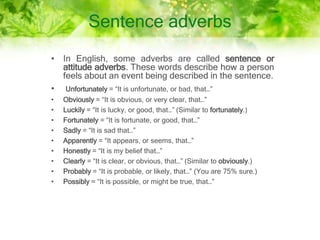Sentence adverbs
- 1. Sentence adverbs A useful and simple way to describe your attitude
- 2. Sentence adverbs • In English, some adverbs are called sentence or attitude adverbs. These words describe how a person feels about an event being described in the sentence. • Unfortunately = “It is unfortunate, or bad, that…” • Obviously = “It is obvious, or very clear, that…” • Luckily = “It is lucky, or good, that…” (Similar to fortunately.) • Fortunately = “It is fortunate, or good, that…” • Sadly = “It is sad that…” • Apparently = “It appears, or seems, that…” • Honestly = “It is my belief that…” • Clearly = “It is clear, or obvious, that…” (Similar to obviously.) • Probably = “It is probable, or likely, that…” (You are 75% sure.) • Possibly = “It is possible, or might be true, that…”
- 3. • Unfortunately, when the fire fighters came, the wood was already destroyed. • I didn’t think he would get here on time, but here he is, so, obviously, I was wrong. • I left my wallet on the shop counter but, luckily, someone saw and came after to give it back to me. • The road was closed because there had been an accident, but, luckily, we had decided to take another route. • Sadly, she didn’t come out of the coma and died. • I’ve never heard him play, but apparently, he’s one of the top pianists in the world. • Honestly, we’re paying too much attention to your brother’s antics. Let’s ignore him from now on. • Clearly, it’s going to snow soon. I can smell it in the air. • Cristiano Ronaldo is probably one of the best-paid athletes in the world. • The Beatles are possibly the most famous music band of all times.


